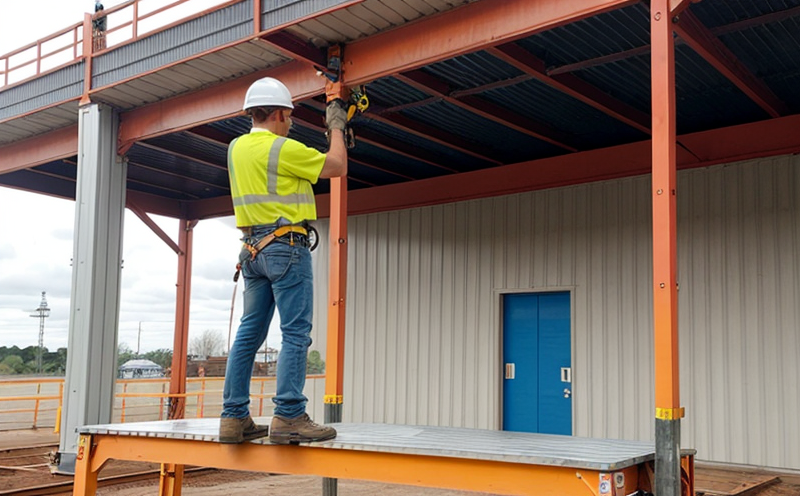Elevated Work Platform Structural Safety Testing
The Elevated Work Platform (EWP) structural safety testing is a critical component of ensuring workplace safety and compliance with industry standards. EWPs are used in numerous sectors, from construction to utilities, where workers need access to elevated areas without the use of scaffolding or ladders.
These platforms are often temporary structures that must be capable of supporting the weight of workers and their equipment during operations. The testing process involves a series of inspections and evaluations to ensure the structural integrity and compliance with relevant standards such as ISO 13857:2016, EN 379-1:2014, or ASTM F2387.
The primary aim is to assess whether EWPs meet safety requirements under static load conditions. This includes the ability of the platform and its components to withstand various loads without failing. The testing process also involves evaluating the stability of the EWP during operation, ensuring that it remains secure even when subjected to dynamic forces such as wind or worker movement.
The structural integrity test typically begins with a visual inspection followed by a load-bearing assessment. During this phase, calibrated weights are used to simulate the maximum anticipated load on the platform. The testing procedure ensures that the EWP can support these loads without any visible signs of damage or deformation.
For more complex platforms, additional tests may be required such as dynamic loading tests where forces similar to those experienced during actual use are applied. These tests help determine if the EWP can withstand sudden changes in load and maintain stability under these conditions.
The results from these tests provide critical information needed for compliance with regulatory requirements. By adhering strictly to established standards, organizations can ensure their EWPs meet necessary safety criteria, thereby protecting both workers and assets involved in the operations.
Understanding the importance of this testing cannot be overstated; it plays a pivotal role in maintaining occupational health and safety across various industries. Regular inspections not only enhance worker confidence but also contribute significantly to reducing workplace accidents associated with improper EWPs.
Industry Applications
| Industry Sector | Key Applications |
|---|---|
| Construction | Elevating workers for building maintenance and repair tasks |
| Utilities | Accessing high-voltage equipment during inspections or repairs |
| Pipeline Inspection | Inspecting the integrity of pipelines at elevated heights |
| Road Construction | Performing maintenance and repair work on bridges and overpasses |
| Industry Sector | Key Applications |
|---|---|
| Mining | Accessing remote locations for safety checks or extraction operations |
| Railway Maintenance | Inspecting and maintaining track integrity at elevated levels |
| Tower Installation | Elevating workers to install communication towers in urban areas |
| Oil and Gas | Maintaining offshore platforms and inspecting equipment on rigs |
The versatility of EWPs makes them indispensable across many industries where access to elevated areas is required. Whether it's for routine maintenance or emergency repairs, ensuring the structural integrity of these platforms through rigorous testing ensures both efficiency and safety.
Why Choose This Test
Selecting the right kind of structural safety test for your Elevated Work Platform (EWP) is essential to ensure compliance with industry standards and protect workers from potential hazards. Our comprehensive EWP structural safety testing service offers several key advantages that make it a preferred choice:
- Compliance Assurance: Ensures adherence to international standards like ISO 13857:2016, EN 379-1:2014, and ASTM F2387.
- Rigorous Evaluation: Utilizes advanced testing methods that simulate real-world conditions, providing accurate assessments of the EWP's structural integrity.
- Expert Guidance: Our team comprises experienced professionals who understand the nuances of each industry sector, offering tailored solutions to meet specific needs.
- Cost-Effective Solutions: By identifying potential issues early on, this testing helps avoid costly repairs or replacements later down the line.
- Enhanced Worker Safety: Regular inspections not only comply with regulations but also significantly reduce the risk of accidents and injuries associated with faulty EWPs.
- Data-Driven Decisions: Accurate test results provide clear insights into the condition of your EWP, enabling informed decision-making regarding maintenance schedules or upgrades.
With these benefits in mind, choosing our EWP structural safety testing service ensures not only regulatory compliance but also peace of mind for everyone involved. Investing in regular inspections can save money and lives by preventing accidents that could otherwise occur due to overlooked flaws.
Quality and Reliability Assurance
The quality and reliability assurance processes associated with Elevated Work Platform (EWP) structural safety testing are designed to ensure the highest standards of performance and durability. Our team adheres strictly to international guidelines such as ISO 13857:2016, EN 379-1:2014, and ASTM F2387 to provide accurate assessments that meet industry requirements.
Our testing methodology begins with a thorough visual inspection of the EWP. This initial step allows us to identify any visible signs of damage or wear that could compromise safety. Following this, we proceed to apply calibrated loads on the platform to test its ability to support these weights without failure. These load tests are conducted under controlled conditions simulating actual usage scenarios.
In addition to static loading tests, our service also includes dynamic loading assessments if required by specific applications or regulatory demands. Dynamic loading simulates sudden changes in load and evaluates the EWP's stability during such events. This comprehensive approach ensures that all aspects of the platform are thoroughly examined for any potential weaknesses.
The results from these tests form the basis of our detailed reports, which outline findings alongside recommendations for necessary actions to maintain optimal performance. These reports serve as valuable tools for decision-makers in planning maintenance schedules or making strategic investments in new equipment.
By maintaining strict adherence to established standards and employing expert knowledge throughout every phase of the testing process, we guarantee reliable results that instill confidence among stakeholders involved in EWP operations.





